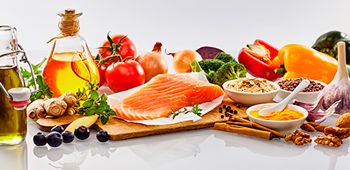
Anxiety is a mental illness that has become a concern in the past few years. Anxiety has always existed, but the knowledge of it arise in the 19th century thanks to medical research and scientific studies. Now, anxiety influences a huge percentage of individuals since social media and the COVID-19 pandemic increase the factors of experiencing anxiety; this mental illness has become present in children, adolescents, adults, and older people.
According to the National Institute of mental health, anxiety disorders are the most common mental illness in the United States. That’s 40 million adults—18% of the population—who struggle with anxiety. Anxiety and depression often go hand in hand, with about half of those with depression also experiencing anxiety[1].
While therapy, medication, and self-care practices are essential in managing anxiety, we often overlook the impact of our diet on our mental well-being. Some researchers have explored the relationship between anxiety and the food we eat and how making mindful choices can support a calmer and more balanced state of mind.
Some foods are good to calm the symptoms of anxiety and depression. Although it is possible to achieve a better mental health condition with a true diet (and we will show some foods that help), it is imperative to visit your doctor or healthcare provider for a proper prescription.
Which Foods Are Good For Anxiety?
When it comes to the first meal of the day and probably the most important of our diet, our food choices must be the most conscious ones. Some breakfast can help with the symptoms of anxiety if we incorporate nutrient-rich foods that support mental well-being and provide sustained energy throughout the day. Nevertheless, how do we know what breakfasts are good for anxiety? Here are some breakfast ideas that can contribute to a calmer and more balanced state of mind:
- Oatmeal with berries and nuts has been linked to anxiety reduction: Eating oatmeal in the morning can boost your mood thanks to its antioxidants.
- Greek yogurt: Greek yogurt is a great source of protein, which can help stabilize blood sugar levels and promote a feeling of fullness. The combination of fruits adds natural sweetness, fiber, and vitamins to your breakfast, supporting overall mental well-being[2].
- Smashed avocado toast: Avocados are rich in healthy fats, including omega-3 fatty acids and monounsaturated fats, which have anti-inflammatory properties and can help support brain health.
- Spinach and mushroom omelet: Eggs provide high-quality protein and contain important nutrients like vitamin D and B vitamins, which are essential for neurotransmitter production and regulation. The spinach and mushrooms add an extra dose of folate and antioxidants[3].
- Smoothie bowl: This breakfast is packed with vitamins, minerals, and antioxidants that support brain health and can provide a refreshing start to your day.
However, breakfast is only one meal of the day, and while there is no specific “magic” food that will cure anxiety, incorporating these anxiety and depression-friendly foods into your diet throughout the day may help alleviate symptoms.
- Omega-3 fatty acids: Studies have shown that omega-3 fatty acids, found in fatty fish (such as salmon, sardines, and mackerel), walnuts, flaxseeds, and chia seeds, may have antidepressant effects. They are related to the brain´s health support and reduce inflammation[4]. There are plenty of dishes you can cook with Omega-3 fatty acids, but laboratories and pharmaceutics now sell this nutrient as supplements.
- Antioxidant-rich foods: Fruits and vegetables high in antioxidants, such as berries, citrus fruits, kale, spinach, and bell peppers, contain compounds that may protect against oxidative stress, which is linked to depression. Vitamins A, C, and E are an example of antioxidants; also, selenium plays a big role in reducing anxiety and depression.
- Whole grains: Whole grains like quinoa, brown rice, and whole wheat bread are complex carbohydrates that release energy slowly, providing a steady supply of glucose to the brain. This can help stabilize mood and prevent fluctuations in blood sugar levels. Cereal grains are the most essential food staples. They are eaten almost daily by large populations. They supply a significant percentage of the calories consumed by the world’s population. Cereal grains and the products made from them provide food not only for people, but also for livestock, such as cattle, chickens, and hogs[5].
Probiotics and foods rich in B Vitamins
Fermented foods like yogurt, kefir, kombucha, and kimchi contain beneficial bacteria that may influence mood and brain function. Foods rich in vitamin B, particularly folate (B9) and vitamin B12, are important for brain health as well. Leafy greens, legumes, eggs, and lean meats are good sources of these vitamins.
- Berries, such as blueberries, strawberries, and raspberries. Berries are rich in antioxidants and vitamin C, which can help reduce oxidative stress and inflammation in the body, contributing to improved mental well-being.
- Herbal teas: Sip on calming herbal teas like chamomile, lavender, or lemon balm. These teas have natural soothing properties and can promote relaxation and a sense of tranquility. However, “herbal supplements aren’t monitored by the FDA the same way medications are. Despite enhanced quality control regulations in place since 2010, the quality of some supplements may still be an issue. Remember, natural doesn’t always mean safe.” [6]
Everyone’s dietary needs and preferences may vary, so it is important to pay attention to your body and choose food options that work best for you. Consulting with a registered dietitian can also provide personalized guidance and recommendations prescripted by your doctor.
Plenty of meals and foods that we eat on a daily basis can provoke anxiety symptoms, and sometimes we do not know. While there are no specific foods that cause anxiety, certain dietary choices can potentially contribute to feelings of unease. Some of these foods might include common beverages like caffeine and alcohol, and here we will tell you how and why you should avoid them.
Worst Foods for Anxiety
Caffeine: according to Medical News Today[7], a survey conducted in the United States reports that approximately 85% of the population drinks at least one caffeinated beverage every day and stimulants like caffeine found in coffee, tea, energy drinks, and some sodas could trigger or worsen anxiety symptoms. Caffeine stimulates the central nervous system, leading to increased heart rate, jitters, and feelings of restlessness. It can also interfere with sleep, which is important for maintaining mental well-being. So, it is recommended to drink a moderate amount of caffeine.
Sugar and refined carbohydrates: Foods high in sugar and refined carbohydrates, such as sugary snacks, pastries, and white bread, can cause rapid fluctuations in blood sugar levels. Avoiding processed foods and foods high in sugar means the body experiences fewer highs and lows of blood sugar, which helps to further reduce feelings of anxiety. Very simply put, a sugar rush can mimic a panic attack[8].
Alcohol: While alcohol is often used as a temporary means of relaxation, it can have a negative impact on anxiety. Alcohol is a depressant that affects the central nervous system, and excessive consumption can lead to feelings of depression, restlessness, and increased anxiety[9].
Processed and fast foods: Highly processed foods, including fast food meals, packaged snacks, and fried foods like french fries, are often high in unhealthy fats, artificial additives, and preservatives. These foods provide little nutritional value and can lead to inflammation and oxidative stress in the body, potentially impacting mental well-being.
“Recently, researchers investigated the link between fried foods consumption and depression and anxiety. They found that fried food consumption, especially fried potatoes, is linked to an increased risk of anxiety and depression.” [10]
“Ideal” Diet While Having Anxiety
While it may be helpful to minimize or avoid these potential anxiety-aggravating foods and eat some of the most nourishing food, it’s important to maintain a balanced and varied diet. Everyone’s dietary needs and responses are unique, so it can be helpful to work with your doctor, such as a registered dietitian, to create an individualized nutrition plan that supports your overall mental well-being.
Additionally, practicing mindful eating, maintaining regular meal times, and incorporating stress-management techniques into your lifestyle can contribute to better anxiety management.
As we see, food cannot eliminate anxiety, but it can play a significant role in managing its symptoms and supporting overall mental well-being. By making conscious choices to incorporate mood-stabilizing nutrients, limit sugar and caffeine intake, and adopt a balanced and mindful approach to eating, we can nourish our minds and create a foundation for greater calmness and resilience. Remember, everyone’s experience with anxiety is unique, but let food be your ally in your journey toward an anxiety-free life.
Contact Us to Learn More
Coming to terms with having anxiety can be a very difficult process for those who are suffering from it because its causes go beyond superficial assumptions. Our team at LIMARP®, led by Dr. Liza María Pompa González, is equipped with mental health professionals in order to help our patients reach their health goals and guide them throughout their journey.
There are several types of eating disorders and all of them are complex, meaning that their root cause may vary from patient to patient; in order to identify and treat them, we recommend you schedule an appointment with one of our doctors to avoid self-diagnosis. We can help determine the right treatment for you. Contact us online anytime or give us a call at (619) 373-0229.
References
- [1, 3] “Nutritional strategies to ease anxiety”. https://www.health.harvard.edu/blog/nutritional-strategies-to-ease-anxiety-201604139441 (Accessed June 21, 2023).
- [2] “Coping with anxiety: Can diet make a difference?”. https://www.mayoclinic.org/diseases-conditions/generalized-anxiety-disorder/expert-answers/coping-with-anxiety/faq-20057987 (Accessed June 21, 2023).
- [4] “What foods are good for helping depression?”. https://www.medicalnewstoday.com/articles/318428#vitamin-d (Accessed June 21, 2023).
- [5] “Food”. https://education.nationalgeographic.org/resource/food/ (Accessed June 21, 2023).
- [6] “Herbal treatment for anxiety: Is it effective?”. https://www.mayoclinic.org/diseases-conditions/generalized-anxiety-disorder/expert-answers/herbal-treatment-for-anxiety/faq-20057945 (Accessed June 21, 2023).
- [7] “What to know about caffeine and anxiety”. https://www.medicalnewstoday.com/articles/anxiety-and-caffeine (Accessed June 21, 2023).
- [8] “Eating well to help manage anxiety: Your questions answered”. https://www.health.harvard.edu/blog/eating-well-to-help-manage-anxiety-your-questions-answered-2018031413460 (Accessed June 21, 2023).
- [9] Schuckit MA. Alcohol, Anxiety, and Depressive Disorders. Alcohol Health Res World. 1996;20(2):81-85. PMID: 31798156; PMCID: PMC6876499.
- [10] “Eating French fries and other fried foods linked to higher risk of anxiety and depression”. https://www.medicalnewstoday.com/articles/fried-foods-french-fries-linked-to-anxiety-depression (Accessed June 21, 2023).


